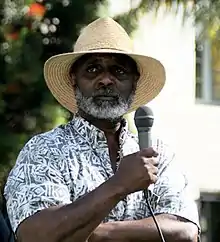Cedric Robinson
Cedric Robinson (November 5, 1940 – June 5, 2016)[1][2][3] was a professor in the Department of Black Studies and the Department of Political Science at the University of California, Santa Barbara (UCSB). He headed the Department of Black Studies and the Department of Political Science and served as the Director of the Center for Black Studies Research. Robinson's areas of interest included classical and modern political philosophy, radical social theory in the African diaspora, comparative politics, racial capitalism, and the relationships between and among media and politics.

Early life
Robinson was born in Oakland, California, on November 5, 1940. He attended the University of California, Berkeley, where he earned a B.A. in social anthropology in 1963, and Stanford University, where he received an M.A. and Ph.D. in political theory in 1974.
He became an political activist during his student days, when he protested against the university administration and American foreign and domestic policies along with other Black radical students.[4]
Robinson's grandfather influenced his radical political views. As a political radical in 1920s Alabama, his grandfather was ultimately forced to leave to save his life and decided to go to California. Robinson named Winston Whiteside, C. L. R. James, and Terrence Hopkins as other thinkers who shaped his political outlook.[5]
Career and public service
After leaving Berkeley, Robinson was drafted into the U.S. Army and also worked at the Alameda County Probation Department.[6] From 1971 to 1973, Cedric was a lecturer in Political Science and Black Studies at the University of Michigan. In 1973, Cedric accepted his first tenure, a track job at Binghamton University–State University of New York. In 1978, Robinson joined the faculty at the University of California, Santa Barbara, and became director of the Center for Black Studies Research.
In 1980, trying to correct what they saw as overall media bias as well as media laziness in accepting what the White House, the US State Department, and The Pentagon said about the Third World and American relations with it, Robinson and UCSB student Corey Dubin started Third World News Review (TWNR) on the campus and community radio station, KCSB. Five years later the program became available on public access television. Since 1980, UCSB students from the Third World and other UCSB faculty members have contributed to the program, produced it, or both.[7]
The author of five books, Robinson also had articles appear in academic journals and anthologies on subjects ranging from political thought in the United States, Africa, and the Caribbean to Western social theory, film, and the press.
Selected bibliography
Books
- Forgeries of Memory & Meaning: Blacks & the Regimes of Race in American Theater & Film Before World War II. Chapel Hill, NC: University of North Carolina Press, 2007.
- An Anthropology of Marxism. London: Ashgate Publishing, 2001.
- Black Marxism: The Making of the Black Radical Tradition. 1st ed., London: Zed Books, 1983. 2nd ed., Chapel Hill, NC: University of North Carolina Press, 2000.
- Black Movements in America. New York: Routledge, 1997.
- Terms of Order: Political Science and the Myth of Leadership. Albany, NY: State University of New York Press, 1980.
Journal articles[8]
- "In the Year 1915: D.W. Griffith and the Whitening of America." Social Identities, Vol. 3, No. 2, June 1997.
- "In Search of a Pan-African Commonwealth." Social Identities, Vol. 2, No. 1, February 1996.
Essays
- "Mass Media and the U.S. Presidency", in Questioning the Media: A Critical Introduction, ed. by John Downing et al. Thousand Oaks, CA: SAGE Publications, 1995.
- "W. E. B. Du Bois and Black Sovereignty", in Imagining Home: Class, Culture, and Nationalism in the African Diaspora, ed. by Sidney J. Lemelle and Robin D. G. Kelly. New York: Verso Books, 1994.
- "Race, Capitalism, and the Anti-Democracy", in Reading Rodney King/Reading Urban Uprising, ed. by Robert Gooding-Williams. New York: Routledge, 1993.
Secondary literature
- "Cedric Robinson and the philosophy of Black resistance", in a special issue of Race & Class, guest edited by Darryl C. Thomas. October 2005, Volume 47, No. 2
References
- "Office of the Chancellor, UC Santa Barbara"
- "In Memoriam: Cedric Robinson (1940-2016)" Archived 2016-08-20 at the Wayback Machine, University of California Humanities Research Institute, June 7, 2016.
- "'A Brilliant Political Theorist': David Leonard Reflects On Cedric Robinson", African American Intellectual History Society (AAIHS), June 8, 2016.
- Cedric J. Robinson: the Making of a Black Radical Intellectual, Robin Kelley, June 2016
- Revisiting Black Marxism in the Wake of Black Lives Matter, Robin Kelley, November 2016
- "Cedric J. Robinson: the Making of a Black Radical Intellectual". www.counterpunch.org. 2016-06-17. Retrieved 2017-01-15.
- Elizabeth Robinson, "Twenty-five years of the Third World News Review," Race & Class, October 2005; Vol. 47, No. 2: 77-81, citation p. 78.
- For a more complete bibliography, see "Bibliography of publications by Cedric Robinson" in Race & Class, October 2005, Vol. 47, No. 2, 115–118.
External links
- "Celebrating the Black radical tradition", Institute of Race Relations, September 28, 2005.
- Gregory Meyerson, "Rethinking Black Marxism: Reflections on Cedric Robinson and Others", Cultural Logic, Vol. 3, No. 2, Spring 2000.
- Chuck Morse, "Capitalism, Marxism, and the Black Radical Tradition: An Interview with Cedric Robinson", Perspectives on Anarchist Theory, Vol. 3, No. 1, Spring 1999.
- "Cedric Robinson: Short Biography & Selected Works", Perspectives on Anarchist Theory, Vol. 3, No. 1, Spring 1999.
- Cornel West, "The Making of the Black Radical Tradition", Monthly Review, Vol. 40, No. 4, September 1988.
- Robin D. G. Kelley, "Cedric J. Robinson: the Making of a Black Radical Intellectual", "Counter Punch, June 2016